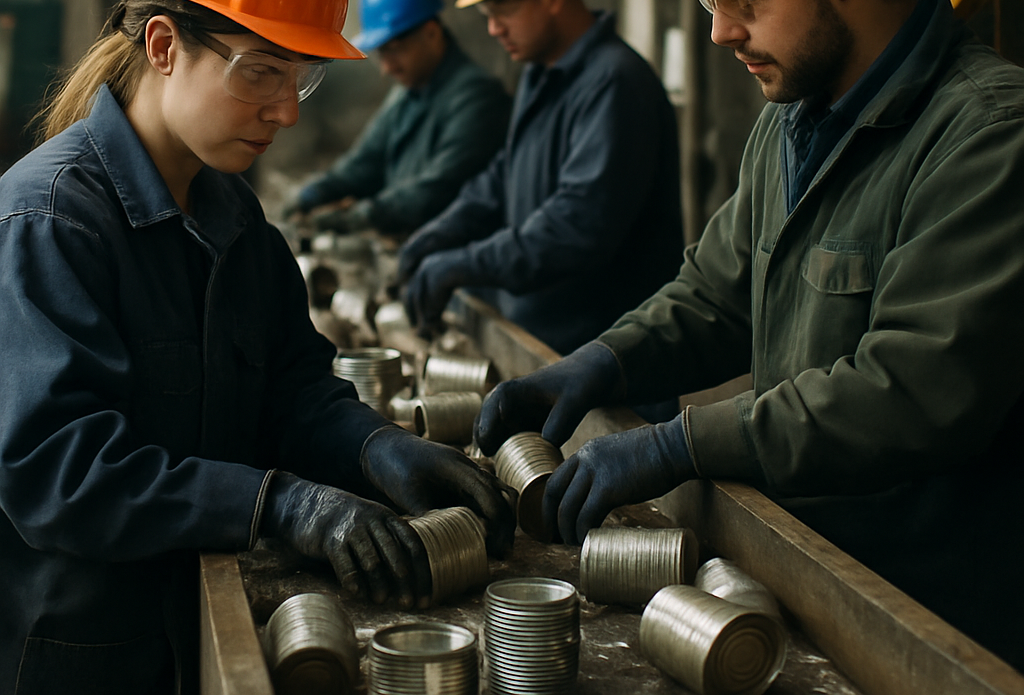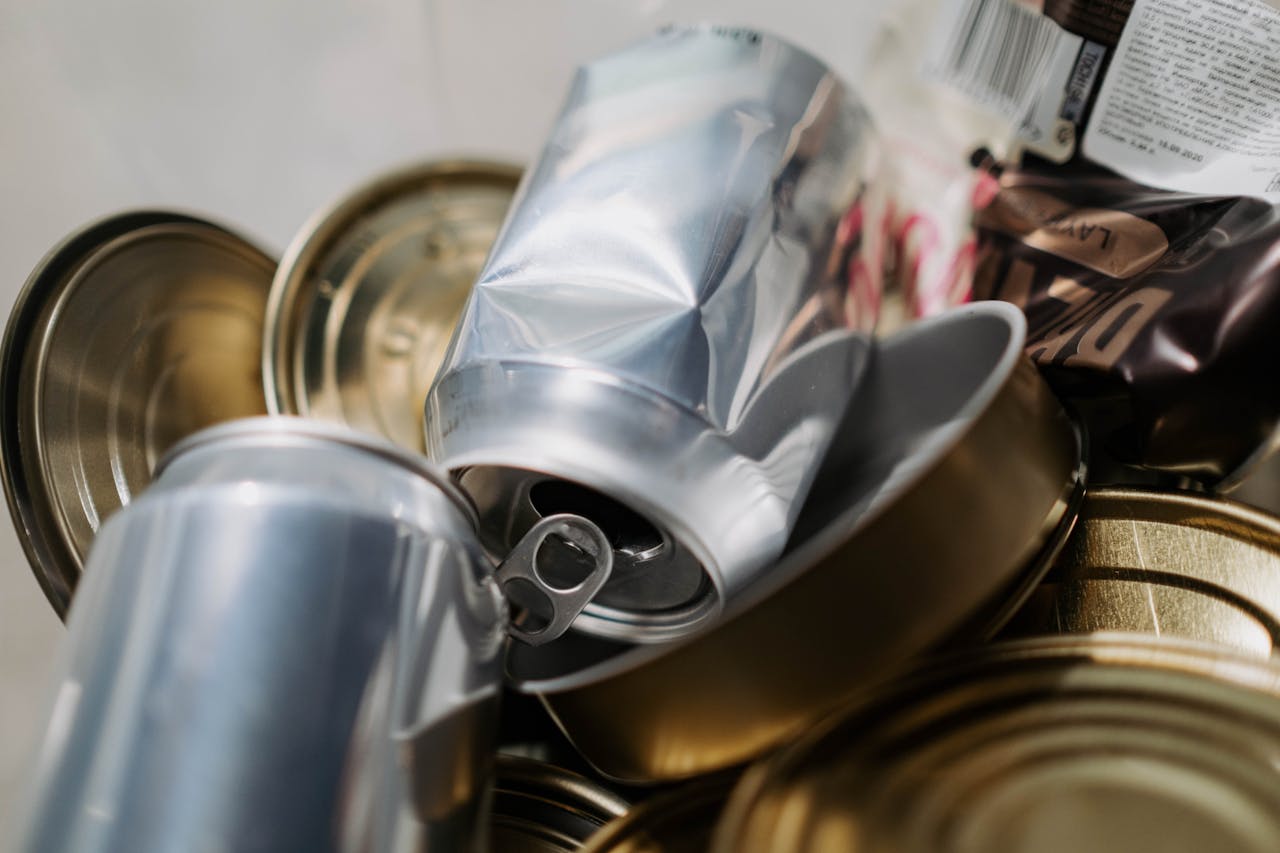5901 Botham Jean Blvd, Dallas, TX 75215
What Is Tin Can Recycling and Why Is It Important?
June 28, 2025Over 85.5% of steel packaging in Europe is recycled each year. This impressive figure underscores the success of the tin can recycling system.
Tin can recycling involves collecting and reprocessing used tin cans into new products. This process transforms discarded containers into valuable materials for reuse. While most tin cans aren’t made entirely of tin, they primarily consist of steel with a thin tin coating to prevent corrosion.
The strength of this material combination lies in its recyclability. Steel can be recycled indefinitely without degrading in quality, making tin cans one of the most sustainable packaging options available in waste management systems.
How Does the Tin Can Recycling Process Work?

Workers efficiently sorting and processing tin cans at a recycling facility.
The tin can recycling process transforms used containers into valuable resources through a series of efficient steps, diverting metal from landfills and conserving energy compared to producing new cans from raw materials.
Collection: The First Step
The recycling journey begins when consumers place their tin cans in recycling bins. These bins are collected through curbside programs or taken to community drop-off centers. The quality of collected materials directly impacts the efficiency of the recycling process.
Proper preparation of cans before collection is crucial. Rinsing containers to remove food residue prevents contamination and improves recycling efficiency. While labels don’t need to be removed, cans should be relatively clean and empty.
Sorting: Separating Materials
Once collected, cans arrive at Material Recovery Facilities (MRFs) where sorting takes place. Powerful magnets pull steel cans from the mixture of recyclables, while eddy current separators help identify and separate aluminum cans.
This magnetic separation is effective because steel cans are naturally attracted to magnets, while aluminum cans are not. Advanced optical sorters and manual pick lines further refine the separation process, ensuring material purity before the next stage.
Cleaning and Preparation
Sorted cans undergo thorough cleaning to remove remaining contaminants. Industrial washing systems use specialized chemical baths, often containing sodium hydroxide, to strip away food residue, labels, and coatings that might interfere with recycling.
This cleaning step is crucial for maintaining the quality of the recycled metal, as contaminants can weaken the final product or cause imperfections that make the material less valuable.
Shredding and Size Reduction
Clean cans are fed into industrial shredders that break them into small, uniform pieces. This size reduction increases surface area for efficient melting and makes the material easier to handle in subsequent steps.
The shredded metal pieces, now reduced to manageable fragments, move on conveyor systems to the melting furnaces. The uniformity ensures consistent melting temperatures and quality.
Melting and Transformation
The core of the recycling process occurs in high-temperature furnaces where shredded metal is melted at approximately 2,700°F. This intense heat transforms the solid metal into molten form, allowing impurities to be removed.
Quality control measures, including X-ray fluorescence analyzers, monitor the composition of the molten metal to ensure it meets industry standards. It is then formed into ingots or sheets for manufacturing new products.
Creating New Products
The recycled metal can be used to produce new cans or be transformed into different products. Steel from recycled cans might become automotive parts, construction materials, or appliances. The versatility of recycled metal makes it valuable in multiple industries.
This closed-loop system allows tin cans to be recycled repeatedly without a loss in quality. In fact, 75% of all tin cans ever produced are still in use today through continuous recycling.
The entire process from collection to new product creation typically takes less than 60 days, demonstrating the efficiency of modern recycling systems. By participating in tin can recycling, we help conserve natural resources and reduce the environmental impact of manufacturing new products from raw materials.
What Are the Environmental Benefits of Recycling Tin Cans?

Recycling tin cans provides significant environmental benefits by conserving resources. Recycling a ton of steel saves about 2,500 pounds of iron ore, 1,400 pounds of coal, and 120 pounds of limestone. This conservation helps mitigate the harmful effects of mining, such as habitat destruction, soil erosion, and water contamination.
The energy efficiency of recycling tin cans is remarkable. It requires about 75% less energy than producing new steel from raw materials, leading to reduced greenhouse gas emissions. Manufacturing steel from scratch consumes a lot of energy and produces significant carbon dioxide, whereas recycling reduces this environmental footprint.
Recycling tin cans also plays a crucial role in waste reduction. These metal containers can occupy landfills for decades before decomposing, consuming valuable space. Recycling helps tackle waste management challenges, particularly as many communities navigate limited landfill capacity.
Notably, recycling tin cans supports a circular economy, where materials are reused multiple times. Unlike linear consumption, where materials are discarded after one use, this approach keeps valuable resources in circulation. Steel can be recycled indefinitely without losing quality, making tin cans ideal for closed-loop recycling systems.
Although less frequently discussed, the water conservation benefits of recycling tin cans are significant. Producing virgin steel requires substantial water for processing and cooling, whereas recycling uses considerably less. This is vital for preserving water, especially in regions dealing with scarcity.
How Can Consumers Properly Recycle Tin Cans?
Properly recycling tin cans involves more than just tossing them into a bin. The quality of recycled materials significantly depends on how consumers prepare these items before disposal. When correctly handled, tin cans can be processed indefinitely without losing quality, making them one of the most sustainable packaging materials available.
The first essential step is to rinse your cans thoroughly. Food residue is a major contaminant in the recycling stream. A quick rinse under the tap removes most food particles, preventing contamination of other recyclables and significantly improving the recycling process’s efficiency.
Preparation Guidelines for Tin Can Recycling
While labels on tin cans don’t always need removal, it can enhance recycling efficiency. Paper labels can introduce impurities during the melting process. If you can peel them off, the resulting recycled material will be of higher quality.
Contrary to common belief, crushing cans is not always helpful. Some recycling facilities prefer uncrushed cans because their sorting equipment is designed to identify and process intact containers. Check your local recycling guidelines to understand preferences in your area.
Removing the lids completely is another useful practice. Partially attached lids can injure recycling workers or jam sorting machinery. Either remove the lid entirely and place it separately in the recycling bin or ensure it’s pushed down inside the can.
Following Local Recycling Regulations
Recycling guidelines vary significantly by location. What works in one municipality might not be acceptable in another. Some areas have specific requirements about how clean containers should be or whether certain types of tin-coated cans are accepted.
Contact your local waste management authority or visit their website to understand the specific requirements for your area. Many recycling programs offer searchable databases where you can look up how to dispose of specific items properly.
Place your prepared tin cans in the correct recycling bin according to local sorting requirements. Some programs use single-stream recycling, where all recyclables go in one container, while others require separation of different materials.
The Impact of Proper Consumer Recycling
Your efforts in properly preparing tin cans for recycling have far-reaching effects. Clean, properly sorted materials require less processing at recycling facilities. This translates to energy savings, reduced operational costs, and higher-quality recycled materials.
When contamination levels are low, recycling becomes more economically viable. Recycling facilities can process materials more efficiently and produce higher-grade recycled metals. These quality materials then re-enter the manufacturing stream, reducing the need for virgin resources.
The collective impact of individual actions is substantial. Every properly recycled tin can represents energy saved, reduced mining of raw materials, and less waste in landfills. By taking a few moments to prepare your tin cans correctly, you contribute significantly to a more sustainable waste management system.
Conclusion: The Future of Tin Can Recycling
Tin can recycling plays a crucial role in sustainable waste management in our resource-conscious world. This process transforms everyday household items into valuable materials, keeping them in circulation and out of landfills. As recycling technology advances, the efficiency of material recovery improves. Steel from recycled tin cans retains its quality indefinitely, making it an ideal material for the circular economy.
Individual actions have a significant impact. By rinsing and properly disposing of tin cans, we support a system that uses 75% less energy than producing new steel from raw materials. This simple act conserves natural resources, including iron ore, coal, and limestone, while reducing greenhouse gas emissions. Each recycled can represents a tangible step toward environmental protection and sustainability.
For your recycling needs, contact Okon Recycling at 214-717-4083.
